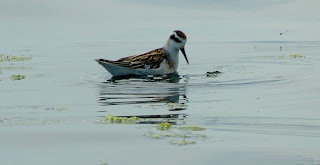A common question from beach goers is, "What does it eat?" To answer that question often takes a lot of background knowledge on the individual species, but a general answer covering the type of animal and its group often will be sufficient. Most people, unless they are brain addled, usually don't want long pontificating lectures when they are trying to have fun at the beach.
So you won't get one here, unless you really want to dig in and pick up some basic information on Feeding Adaptations of Marine Animals. Also thrown in (or out if you like) is a short (not short enough) presentation on Seasons....no pictures just text...so be forewarned.
FEEDING ADAPTATIONS OF MARINE ANIMALS AND SEASONS can be found under BUZZ LINKS as usual. Oh yeah, the image has nothing to do with the blog...I just like it. :)
Tuesday, May 31, 2011
Monday, May 30, 2011
A Few Puget Sound Birds
Bald Eagles and Ospreys have made a dramatic comeback in the past few decades and are now common sights around Puget Sound. A number of waterfowl species use Puget Sound as a wintering ground and as part of migration routes. Gulls, Terns, Grebes may be local residents of migrants depending on species.
Great Blue Herons work the shores in every part of the Sound.
If you want more detailed information on individual North American species; I suggest; The Birder's Handbook, Ehrlich, Dobkin and Wheye. It's doubtful that any hardcore birder lacks this publication in their library....and it's cheap and amazingly my 20 year old paperback copy still has a functional binding.
Great Blue Herons work the shores in every part of the Sound.
If you want more detailed information on individual North American species; I suggest; The Birder's Handbook, Ehrlich, Dobkin and Wheye. It's doubtful that any hardcore birder lacks this publication in their library....and it's cheap and amazingly my 20 year old paperback copy still has a functional binding.
 |
| Harlequin Ducks |
 |
| Bald Eagle harrassed by Crow |
 |
| Crow with Kelp Crab |
 |
| Harlequin Ducks |
 |
| Western Grebe |
 |
| Bald Eagles |
 |
| Double-crested Cormorants |
 |
| Juvenile Bald Eagles |
 |
| Caspian Terns |
 |
| Bald Eagle Juv. |
 |
| Red-breasted Merganser |
 |
| Rhinoceros Auklet |
 |
| Brant Geese |
 |
| Gull with Sea Star |
 |
| Osprey on nest |
 |
| Red-necked Phalarope |
 |
| Canada Geese |
 |
| Common Murre |
 |
| Trumpeter Swans |
 |
| Osprey Juv. |
 |
| Sandpipers |
 |
| Black Turnstone |
 |
| Cormorant and Cascades |
 |
| Gulls with Clam |
 |
| Great Blue Heron with Penpoint Gunnel |
 |
| Bald Eagle mated pair Mt. Baker |
 |
| Great Blue Herons |
 |
| Gull with Plainfin Midshipman |
 |
| Great Blue Heron with Staghorn Sculpin |
 |
| Sandpipers |
 |
| Snow Geese |
 |
| Snow Geese |
 |
| Bald Eagle attack on Swans |
 |
| Brant Geese and Olympics |
 |
| Bald Eagle Jetty Island |
 |
| Osprey Jetty Island |
 |
| Pigeon Guillemots |
 |
| Osprey and Crow |
Sunday, May 29, 2011
What Do They Talk About?
Scientists know animals, and plants (at least in some species), and even microorganisms communicate with one another. We see it in dogs, birds, whales, fish, frogs, and other familiar animals. Communication may be with sound, chemicals, movement, facial expressions or other means (urine and feces are right up there). However it is often difficult to determine just what the communication is all about.....ya, likely food, sex, or the latest episode of South Park or The Daily Show....but we can't always say with a high degree of certainty. Occasionally we are amazed at how close to human communication the subject matter is...often a perfect mirror....as below. Enjoy the holiday weekend....assuming you have one.
| Lacuna family on beach holiday |
| Teamwork, Olea Sea Slug style |
Subscribe to:
Comments (Atom)







